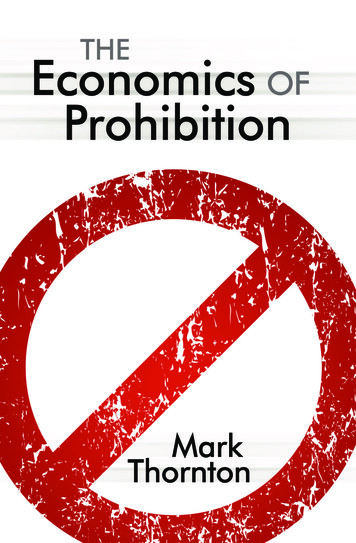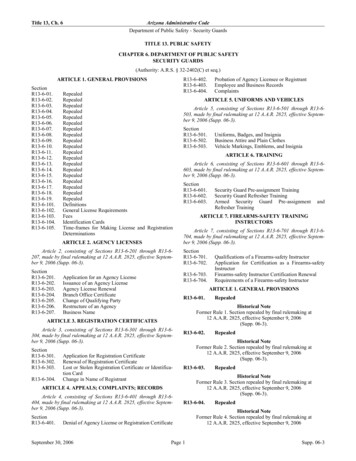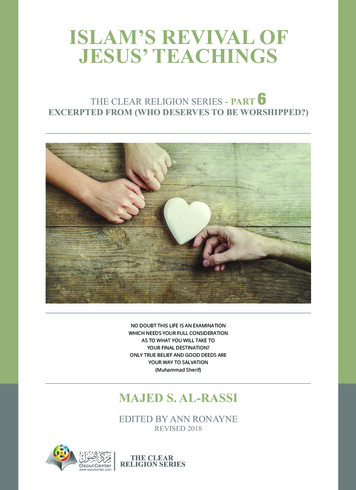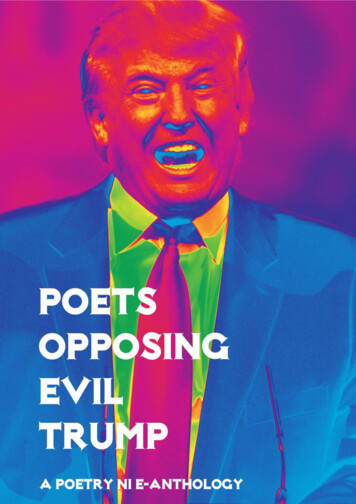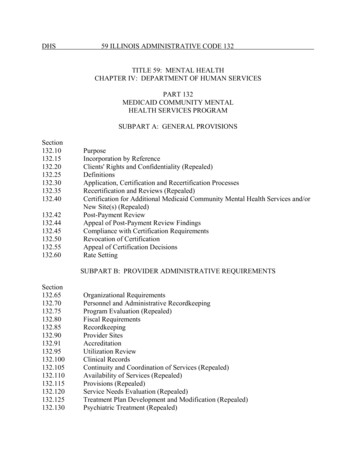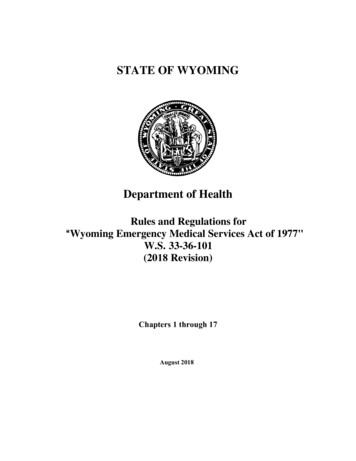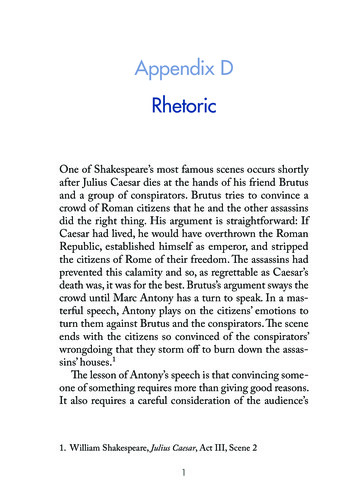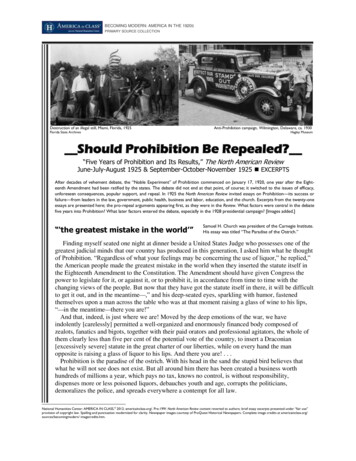
Transcription
BECOMING MODERN: AMERICA IN THE 1920SPRIMARY SOURCE COLLECTIONDestruction of an illegal still, Miami, Florida, 1925Florida State ArchivesAnti-Prohibition campaign, Wilmington, Delaware, ca. 1930Hagley MuseumShould Prohibition Be Repealed?“Five Years of Prohibition and Its Results,” The North American ReviewJune-July-August 1925 & September-October-November 1925 EXCERPTS*After decades of vehement debate, the “Noble Experiment” of Prohibition commenced on January 17, 1920, one year after the Eighteenth Amendment had been ratified by the states. The debate did not end at that point, of course; it switched to the issues of efficacy,unforeseen consequences, popular support, and repeal. In 1925 the North American Review invited essays on Prohibition—its success orfailure—from leaders in the law, government, public health, business and labor, education, and the church. Excerpts from the twenty-oneessays are presented here; the pro-repeal arguments appearing first, as they were in the Review. What factors were central in the debatefive years into Prohibition? What later factors entered the debate, especially in the 1928 presidential campaign? [Images added.]“‘the greatest mistake in the world’”Samuel H. Church was president of the Carnegie Institute.His essay was titled “The Paradise of the Ostrich.”Finding myself seated one night at dinner beside a United States Judge who possesses one of thegreatest judicial minds that our country has produced in this generation, I asked him what he thoughtof Prohibition. “Regardless of what your feelings may be concerning the use of liquor,” he replied,”the American people made the greatest mistake in the world when they inserted the statute itself inthe Eighteenth Amendment to the Constitution. The Amendment should have given Congress thepower to legislate for it, or against it, or to prohibit it, in accordance from time to time with thechanging views of the people. But now that they have got the statute itself in there, it will be difficultto get it out, and in the meantime ,” and his deep-seated eyes, sparkling with humor, fastenedthemselves upon a man across the table who was at that moment raising a glass of wine to his lips,“ in the meantime there you are!”And that, indeed, is just where we are! Moved by the deep emotions of the war, we haveindolently [carelessly] permitted a well-organized and enormously financed body composed ofzealots, fanatics and bigots, together with their paid orators and professional agitators, the whole ofthem clearly less than five per cent of the potential vote of the country, to insert a Draconian[excessively severe] statute in the great charter of our liberties, while on every hand the manopposite is raising a glass of liquor to his lips. And there you are! . . .Prohibition is the paradise of the ostrich. With his head in the sand the stupid bird believes thatwhat he will not see does not exist. But all around him there has been created a business worthhundreds of millions a year, which pays no tax, knows no control, is without responsibility,dispenses more or less poisoned liquors, debauches youth and age, corrupts the politicians,demoralizes the police, and spreads everywhere a contempt for all law.*National Humanities Center: AMERICA IN CLASS, 2012: americainclass.org/. Pre-1991 North American Review content reverted to authors; brief essay excerpts presented under “fair use”provision of copyright law. Spelling and punctuation modernized for clarity. Newspaper images courtesy of ProQuest Historical Newspapers. Complete image credits at americainclass.org/sources/becomingmodern/ imagecredits.htm.
FOR REPEAL“America must open its eyes”Henry Bourne Joy was president of the Packard Motor Car Company. Originally a supporter of Prohibition, he came to oppose itas enforced and testified before Congress for its repeal. His essaywas titled “Prohibition against Human Nature.”Five years have rolled by, and many think that Prohibition has had its chance. Many havecome to think and believe that after the most diligent effort for five years by the government ofthe United States of America to enforce bone-dry prohibition upon our people, it has totallyfailed. Vast appropriations have been made by the national government and by the stategovernments to no avail. In Michigan one of the leading state officials recently said that the moremoney we appropriate and the more people we employ to enforce Prohibition, the more freely isliquor available. . . .Have the American people lost their balance wheel of common sense so that they can nolonger understand human nature? We might as well legislate against the natural functions of existence[i.e., respiration, elimination, etc.] as to seek to continue on our present path towards a completedisrespect for our laws and for the natural rights of a free people.“What is the remedy?”John Philip Hill was a “wet” representative in Congress from Maryland.His essay was titled “A State’s Rights Remedy for Volsteadism.”What is the effect of Prohibition on general crime increase? Today, Leavenworth and Atlanta prisons,both federal penitentiaries, are so overcrowded that they are caring for several hundred convicts above theinstitutions’ facilities. There are about 3,200 now in Leavenworth and 3,023 in Atlanta. Temporarydormitories for the two prisons probably will have to be provided in the industrial shops. Apparently theexperiment in national regulation of local beverages and habits has been a failure and has brought with itincrease rather than decrease in general crime. What is the remedy? . . .I should like to see the Eighteenth Amendment repealed, power being retained by the Congress toprotect the states from outside interference with their local laws, but while the Eighteenth Amendment ispart of the Constitution I feel that there might be a substitute for the Volstead Act [law of Congressimplementing Prohibition] which would greatly improve the existing situation.Repeal the Volstead Act and enact the following:Section 1. Each State shall for itself define the meaning of the words “intoxicating liquors” as usedin Section 1 of Article XVIII of the Amendments to the Constitution of the United States,and each State shall itself enforce within its own limits its own laws on this subject.Section 2. Any person who transports or causes to be transported into any State any beverageprohibited by such State as being an “intoxicating liquor” should be punished by theUnited States by imprisonment for notmore than 10 years or by a fine of notless than 10,000 nor more than 100,000, or by both such fine andimprisonment.The Volstead Act is certain to bemodified. The Eighteenth Amendment, inthe minds of the majority of theAmerican people, was never intended toapply to wine, beer and cider, and by theadoption of such a law as I haveproposed, those states which wish suchbeverages may obtain them legally evenwhile the Eighteenth Amendmentremains part of the Constitution.The Atlanta Constitution, January 15, 1927National Humanities Center “Five Years of Prohibition and Its Results,” The North American Review, summer & fall, 1925, excerpts2
William H. Stayton was vice president of the AssociationAgainst the Prohibition Amendment. His essay was titled“Have We Prohibition or Only Prohibition Laws?”All of us know that terrible evils flow from the abuse of alcohol; all wish to lessen those evils;all believe that in some way it can be done.But how?And this question brings us to the age-long controversy as to whether in dealing with vices,as opposed to crimes we more effectively reach the hearts and minds of men by persuasion orby force and punishment. The United States has adopted the latter method in an effort to banishintoxicating beverages from our country and our lives. How far are we succeeding? . . .FOR REPEAL“how far are we succeeding?”Approximate Arrests for Drunkenness1919, last pre-Volstead year . 892,5951921, first Volstead year . 1,010,1901922, second Volstead year . 1,377,865This enormous increase in drunkenness in so short a time is high corroborative evidence of theincreased consumption of hard liquor. The [Anti Saloon] League maintains the theory that crimes of allsorts are largely due to drunkenness, and consequently increase as intoxication increases. . . .Approximate Arrests for All Causes1919, the last pre-Volstead year . 4,600,8601921, the first Volstead year . 5,557,3101922, the second Volstead year . 6,339,260These figures of the Anti-Saloon League are supported by the official figures, federal, state andmunicipal [city], and established the fact that (1) arrests for intoxication and (2) arrests for all causes havegreatly increased since the passage of the National Prohibition law.To what are such increases due?We believe them to be due to the greater consumption of hard liquor hereinbefore shown to exist. Butif contrary to the prima facie proofs1 advanced, less hard liquor is now consumed, then it follows thatwhen we have less liquor we have more crime, and the Prohibition hypothesis is worse off than before.“in a class by themselves”George Gordon Battle was a New York attorney active in the New YorkDemocratic Party. His essay was titled “The Effect of Prohibition upon Crime.”I believe that the Prohibition laws are regardedas in a class by themselves. Very few of our peoplefeel any obligation to observe these laws. But I donot observe that this habitual violation of theProhibition statutes carries with it any generalcontempt of law. I believe that the great majorityof men and women pay no attention to thesestatutes, but are as obedient as formerly to otherlaws. And in conclusion, I repeat that the mostdangerous feature of the present situation is to mymind the official corruption which now forms sucha scandal in the enforcement of these laws. If stepscan be taken to cleanse the service of this evil, inmy opinion, the principal menace of Prohibitionwill cease to threaten us.The Washington Post, September 16, 1925 [Federal Council of Churches]1Prima facie: “at first sight” (Latin), i.e., on first impression until proven otherwise.National Humanities Center “Five Years of Prohibition and Its Results,” The North American Review, summer & fall, 1925, excerpts3
The workingman is aware that sumptuary laws2 such as the Prohibition Amendment aregenerally enacted for his particular benefit, and to help him to lead a “moral” life, to protect himfrom this, that, and the other thing. He resents this patriarchal [fatherlike/parental] attitude of thelessees [holders] of all goodness and morality, such as the Anti-Saloon League, and demands theliberty to shape his own standard of life, now and hereafter. He rejects the inferiority complexwhich is foisted upon him by “benevolent” employers with the aid of professional reformers. . . .As an American citizen, the workingman has another just as strenuous objection to theProhibition Amendment. The workingman insists upon remaining a citizen of the United Statesof America, and refuses to become a subject of the government, without his specific consent.FOR REPEALJames P. Holland was president of the New YorkState Federation of Labor. His essay was titled“The Workingman’s View of Prohibition.”“he rejects the inferiority complex”Oscar Terry Crosby was a businessman, writer, and formerassistant Secretary of the Treasury. His essay was titled “TheEnforcement of Prohibition.”“the evil results now familiar to us”There have always been thousands of total abstainers and there have always been many morethousands of moderate drinkers. Presumably the present rigid laws were enacted to prevent one man in ahundred from drinking to such excess as would make of him a nuisance and a danger to others. It seemssafe to say that if government had exercised but a small fraction of the tyranny now employed for the totalsuppression of the traffic in intoxicating beverages, it could have dealt with the small fraction ofdrunkards among us with equal success, as far as their elimination is concerned, and without producingthe evil results now familiar to us. . . . [Italics in original]I, for one, shall take no part in the absurdly snobbish attitude of many people of my acquaintance, whoexcuse the Eighteenth Amendment in all its tyranny because it presumably imposes upon the so-called“working classes” particular methods of spending their money. Heaven help us! Let us have done withwhat may be indeed a sincere form of meddlesome-Mattie activity, but what often seems to be a mereaffectation of superiority.“stupid and ineffective Volstead Law”Charles L. Dana was a physician and physiologist specializingin “nervous diseases” [mental illness] at Cornell UniversityMedical College. His essay was titled “Nervous and MentalDiseases and the Volstead Law.”All experience shows that the methods of state control of the sale of alcohol, such perhaps as exist inQuebec or Sweden, are infinitely better than the stupid and ineffective Volstead Law. This opinion is notin conflict with the theory of Prohibition. We are solemnly told that “the law ought to be obeyed” and thatthe best way to get rid of a bad law is to obey it. This kind of Apostolic admonition makes good Sundayeditorial, but it carries no conviction.3 The law forbidding one to play ball on Sunday, or to carry a bottleof wine to a sick friend, makes a very different kind of appeal from that law which forbids one to steal, orassault, or murder.“stimulate a disregard of all law”Henry Samuel Priest was a Missouri attorney who had served as a U.S.district judge. His essay was titled “Prohibition and Respect for Law.”We have hundreds of thousands of laws that should have no place upon the statute books and thatcome to be disregarded as a matter of course and merely stimulate a disregard of all law of whatevercharacter. The Eighteenth Amendment and its enforcing Act [Volstead Act] are a conspicuous type ofsuch frivolous enactment. They are of a purely sumptuary character. They enforce no duty and protect norights. . . . The constitutional provision announces no fundamental principle of government. It is an effortto regulate the morals of the country, to make that immoral and criminal which is neither immoral norcriminal per se [in itself]. The evil consists in the excessive use of intoxicants, not in their moderate use.23Sumptuary laws: laws that forbid or restrict the purchase and/or use of specific items, including alcohol, luxury clothing, etc.I.e., this kind of religious command may sound good in a newspaper’s Sunday editorial, but it does not thereby have any logical or social merit.National Humanities Center “Five Years of Prohibition and Its Results,” The North American Review, summer & fall, 1925, excerpts4
Lawson Purdy was the former tax commissioner of New York City. His essay was titled“States and Statistics.”A great many citizens seem to take it for granted that the Prohibition Amendment and theVolstead Law are more generally violated in New York, New Jersey, and Pennsylvania thanin any other three States of the Union, and that New York stands far ahead of any other Statein the number of violations per thousand of population. . . .Figures of arrests for drunkenness compiled by the Research Secretary of the World LeagueAgainst Alcoholism are summarized for the year 1923. For present purposes data given forfifteen cities, scattered from coast to coast, is reproduced in tabulated form:No. of arrests fordrunkenness, 1923State and City aMaineMinnesotaNebraskaNew YorkNew YorkOregonPennsylvaniaWashingtonWisconsinLos AngelesSacramentoDenverAtlantaSouth BendDes MoinesPortlandSt. PaulOmahaNew York 5553,09945,2267,9743,789No. to 10,000PopulationFOR REPEAL“New York is not as great an 5382.It is probable that these statistics are not absolutely comparable. There are at least two sources oferror: 1. The policy of the police in making arrests for drunkenness probably differs in the differentcities; in some, arrests may be made for much less cause than in others. 2. The classification of arrestsemployed by the officials in the different cities may differ. After making every allowance for thesepossible differences, these statistics nevertheless show that the City of New York is not as great anoffender as are other cities of the country.Carey Orr, “The Unhappy Couple,” Chicago Daily Tribune, Sept. 21, 1925Carey Orr, “Bullet Proof,” Chicago Daily Tribune, April 29, 1926National Humanities Center “Five Years of Prohibition and Its Results,” The North American Review, summer & fall, 1925, excerpts5
James J. Britt was a lead attorney in the Prohibition Unit of theU.S. Treasury. His essay was titled “Prohibition and Respectfor Law.”AGAINST REPEAL“there will be no turning back”Upon the whole, the progress made has justified the hopes of all familiar with the history ofgreat reforms. At the beginning many thought it would take a generation to effect the end[achieve the goal]. We are dealing with human aptitudes deeply ingrained and long-abiding. Ittook more than three hundred years to lead the people of Israel from the practice of idolatry, andmore than forty years for the American people to stop the slave trade after Congress made itunlawful. In the light of human experience, we should not expect complete Prohibition for sometime yet, but that it will come, and be a part of the nation’s order of life, let no one doubt. . . .That there is a general increase of lawlessness, all know, but it has no connection with theProhibition Amendment other than as all laws are involved. It is due to the general lowering ofmorale following a war in which the moral props of centuries were removed. In very truth Satanwas loosed for a season, nor has his recapture been too vigorously undertaken. America, with therest of the world, was tremendously shaken, and has not yet regained its former steadiness. Theletdown is universal. . . .Much of the misunderstanding arises from the fact that it is practically impossible for Prohibition toget a fair report. Nothing in all American history has been so misrepresentative as the attitude of the press.With a few honorable exceptions, it is impossible to obtain a correct news account or favorable commenton anything relating to the subject. . . . Obedience to law, the sober conduct of the great masses, theirquiet pursuit of industry, morality, and religion, furnish no headlines. . . .In Prohibition there will be no turning back. The course of the nation is fixed. The EighteenthAmendment will be honored, not in the breach, but in the keeping.“that is why it is here to stay”Gifford Pinchot was the governor of Pennsylvania and the well-known advocateof conservation. His essay was titled “Prohibition and Law Enforcement.”If the Eighteenth Amendment were a failure, which it is not, Pennsylvania would be a natural place forit to fail. In Pennsylvania it is not a failure but a success. If progress can be made in Pennsylvania it canbe made in any state, for the handicaps are many. . . .My two years’ contact with law enforcement has convinced me beyond question:First. That the Eighteenth Amendment is growing steadily stronger in the confidence andapproval of the American people.Second. That it has already conferred benefits of the largest value and most profound importanceupon our people.Third. That in spite of the activity of the bootleggers and the amount of space their operationsoccupy in the public press, the total drinking of alcohol in this country is insignificant inamount compared to what it was when the Eighteenth Amendment was adopted.Fourth. That the talk of modifying the Volstead Law is mere waste of breath. The proposal to do socould not even lead to serious discussion until the law is actually enforced, and when thattimes comes what little demand there is for modifying it will have disappeared.Fifth. That the law can be enforced, that it will be enforced, that enforcement is gaining onviolation, and that when the federal government demonstrates that it intends to enforce thelaw, which it has never done yet, the problem of law enforcement up to the point of averageefficiency will disappear.The Eighteenth Amendment brings to our people solid advantages which are more and more apparentand more and more fully recognized. That is why it is here to stay.National Humanities Center “Five Years of Prohibition and Its Results,” The North American Review, summer & fall, 1925, excerpts6
Liquor can never “come back.” Those who have hopes or misgivings of the ultimateoutcome of the struggle should consider the history of Kansas. Kansas is forty-five yearsremoved from the thought of legalizing the saloon. Liquor is an outlaw within her borders.She does not want and would not tolerate modification. Conviction of violators is easier thanin the past, because public sentiment has been crystallized; her people realize that intoxicatingliquor is a commercial and social detriment to any community. Kansas officials and privatecitizens are agreed the Prohibition is the state’s best asset.“Does Prohibition prohibit?”Wayne B. Wheeler was an attorney and major publicist with theAnti-Saloon League of America. His essay was titled “Is ThereProhibition? And to What Extent?”Prohibition has accomplished so much that we expect it to build Rome in a day. It hascleaned up so much of the moral and social wreckage of a century in which Booze was Kingthat we are shocked today to find, hidden away furtively in the corner, some of the debris fromthe old Belshazzar’s Feast.4 Here is the situation that existed when Prohibition began to dawnand which made it imperative, and the contrasted situation today.THEN4AGAINST REPEALRichard J. Hopkins was a justice in the Kansas SupremeCourt. His essay was titled “Prohibition and Crime.”“Liquor can never ‘come back’”NOW177,790 licensed liquor saloons, most of them selling afterlegal hours and to minors and drunken persons, also100,000 speakeasies.No licensed saloon. Speakeasies exist, as filthy and criminalas in license [unregulated pre-Prohibition] days.1247 breweries making 2,000,000,000 gallons of beera year.483 cereal beverage plants today produce 151,606,909gallons with less than one-half percent alcohol.No breweries operating lawfully.Few break the law today where courts use padlock power.507 distilleries producing 286,085,463 tax gallons ofdistilled spirits in 1917.No distilleries legally operating. Total British whiskeyexport to Canada and West Indies, 1924, 1,429,274 gallons,a little of which was not drunk by Canadians but wassmuggled into the United States.Drinking made cheap, easy, and inviting.Drinking made costly, difficult, and dangerous.Alcoholic death rate of 5.8 per 100,000 yearly.An alcoholic death rate of 1.1 to 3.2 per 100,000 yearly.An average annual death rate of 13.92 per 1,000.An average annual death rate of 12.36 per 1,000.1,250,000 drunkards arrested yearly, although only 20 percent of public drunkards arrested.Over 350,000 average annual decrease in drunkennessarrests since War Prohibition, although nearly all drunkardsare now arrested.Crowded county jails.200,000 fewer county jail commitments per year. Many jailsempty or for sale.Rising penal ratio [ratio of imprisoned persons to totalpopulation].Drop of 5.8 in penal ratio per 100,000 according to FederalCensus (last criminal census) 1922.Charity societies, Salvation Army, churches, almshouses[poorhouses], etc., spent millions yearly for drink-causedpoverty.Decrease of 74 per cent in drink-caused poverty; federalcensus shows lowest pauperism [poverty] ratio in history.275 drink cures [alcoholism treatments], all busy.27 drink cures, most of which handle alcoholic cases onlyas a “side line.”Belshazzar’s Feast: i.e., debauchery from pre-Prohibition days. As described in the Book of Daniel (Old Testament) and captured in numerous works of art andmusic, the Babylonian king Belshazzar gave a feast for his court, serving wine from sacred Israelite vessels captured in Jerusalem by his father.National Humanities Center “Five Years of Prohibition and Its Results,” The North American Review, summer & fall, 1925, excerpts7
Few delirium tremens wards exist.Saloons on valuable business sites decreaseneighborhood realty values.Realty [land] value of former saloon sites trebled;neighborhood values more than doubled.Slums for poorly paid workers.Fifty-one percent of home building, for workersin 1924; slums practically gone.Red-light districts in license towns [prostitution intowns with no liquor regulations].The brothel has practically vanished.Venereal disease menaces national life.Venereal disease vanishing.Protection of law given to debasing traffic [trade].Drink traffic outlawed.Brewery corruption pervades politics, boycottsbusiness, and threatens courts.Corruption less in politics and business but stillreaching officials although in a less degree.Many times the amount received from liquor licenses spentto care for drink-caused crime, pauperism, and insanity.Liquor criminals through fines pay cost of owndetection, prosecution, and imprisonment.Industrial production checked by blue Mondays [workerabsenteeism after excessive drinking on weekends], drinkcaused accidents, and inefficient drinking workers.Industrial production speeded up, accidentslessened, efficiency increased.Saloons divert over 2,000,000,000 annually fromlegitimate trade [legal businesses].Retail trade, savings, and insurance profit from saloonclosing.Homes wrecked and home building checked [stopped]when saloon took margin of earnings between actualexistence needs [necessities] and total wages.Home building increased 152 per cent since Prohibition,while purchases of small homes have trebled. Building andLoan assets more than doubled in five dry years.AGAINST REPEALDelirium tremens wards full [hospital wards forwithdrawing alcoholics].That is only a sample of the catalogue one might continue, using the deadly parallel, comparingconditions since Prohibition with those before.They are a fair answer to the query: Does Prohibition prohibit?“an honest desire to protect human life”Rev. Walter A. Morgan was chairman of the LawEnforcement Commission of the CongregationalChurches of the United States. His essay was titled“A Moral and Ethical Argument for Prohibition.”The first moral significance of the particular Eighteenth Amendment, it needs to be repeated, lies inthe fact that is registers the will of the great majority of the American people. It sets the standard of a drynation. To permit one’s thinking to become befogged over the matter of enforcement is to refuse to thinkstraight or hard. All men admit that the Eighteenth Amendment is not enforced always and everywhere.Where on American soil is any law always enforced? How many uncaught and unpunished murderers arethere today living in Chicago and New York?The moral quality of the will that voted the nation dry had its origin in a moral and social source. Itwas an honest desire to protect human life. This wish was made concrete and appealing through the livesof women and children. The moral tone of any people rises or falls in accordance with its attitude towardsmothers and their young. As the race has evolved, womanhood and childhood have come to occupy morecommanding positions. Today in the United States the moral sense of the people puts them first. What isgood for them should become a law. So the voters were led to believe and so they acted. Men and womenmerely said, “The liquor business is a menace to our women and children. Let us get rid of it.” . . . . . Salvation Army leaders, social workers, district nurses, Prohibition officers, child welfareorganizations, and others who are in close observance of social conditions, have repeatedly declared thatno other law has worked so great a revolution in social welfare as has Prohibition. . . . Nearly one hundredmillion dollars of funds once spent to cure the harm done by the saloon is now expended in fresh airwork, free dental clinics, prematernity care, district nursing, hospitalization, and other forms of work.Can more be expected when opposition is great and the law is only five years old?National Humanities Center “Five Years of Prohibition and Its Results,” The North American Review, summer & fall, 1925, excerpts8
Howard A. Kelly was a physician and professor atJohns Hopkins University. His essay was titled“Prohibition and the Medical Fraternity.”We insist with every energy at our command that the state has the inalienable right to restrictany action whatever whether it concerns our eating or drinking or other personal habits inorder to promote the public welfare. If the government (nemine contradicente5) controls our useof opium and of cocaine, then why not, by parity of reasoning, alcohol? . . . We believe that this“due regulation” of our conduct for the benefit of the social body is clearly implied in the veryword “government,” and so as citizens who esteem the public welfare as an obligation higherthan our personal tastes, we cheerfully render due obedience to all laws.“blame rests with the older generation”Cornelia James Cannon was a prolific essayiston progressive causes. Her essay was titled“Prohibition and the Younger Generation.”AGAINST REPEAL“for the benefit of the social body”The generation of children growing up, who have never seen a saloon, to whom the oncecommon sight of the Saturday night bacchanalian orgy6 near the drinking resorts is not theordinary tolerated incident of the week, is the generation most profoundly affected by Prohibition.These children are coming to maturity in a worl
the American people made the greatest mistake in the world when they inserted the statute itself in the Eighteenth Amendment to the Constitution. The Amendment should have given Congress the power to legislate for it, or against it, or to prohibit it, in accordance from time to time with the changing views of the people.
